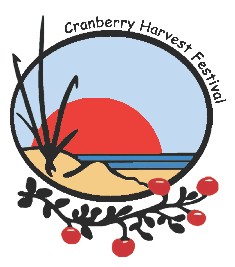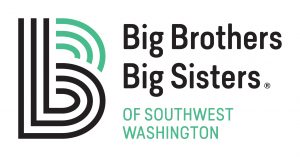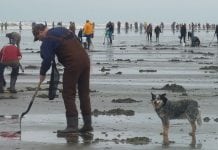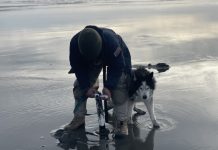This calendar is the place to find fun events happening throughout Grays Harbor County including Aberdeen, Hoquiam, Westport, Ocean Shores, Elma, Montesano and beyond.
Have an event that isn’t listed? Please email events@GraysHarborTalk.com with the following information:
- Name of Event
- Date, time and location (name of business if applicable and complete address)
- Organizer(s) name
- Cost
- URL to purchase tickets
- Website URL
- SHORT description of event
- Photo
Our editors will review and post within a few business days.

Immerse yourself in cranberries. Shop at our vendors, take a bog tour, enter the cranberry cook off, run in the bog jog and enjoy firelight parade. For more details on the event, call Westport-Grayland Chamber of Commerce at 360-268-9422. For a Vendor Registration Form, Hold Harmless Agreement and Vendor Information Sheet, go to https://ComeToWestport.com and click on the Events Calendar.
WDFW approves seven days of coastal razor clam digs beginning Oct. 8
OLYMPIA – Washington Department of Fish and Wildlife (WDFW) shellfish managers confirmed today razor clam digging opportunities at Long Beach, Twin Harbors, and Copalis beaches from Oct. 8-14.
“Most of the 2,700 harvesters who went out during last week’s season opener found easy digging, and we’re expecting more of the same,” said Dan Ayres, WDFW coastal shellfish manager. “As usual, we’ll continue to test and monitor the situation closely prior to all planned openings.”
The following digs during evening (p.m.) low tides will proceed as scheduled, after marine toxin results from the Washington Department of Health (DOH) showed razor clams are safe to eat:
- Oct. 8, Saturday, 6:21 p.m.; 0.5 feet; Long Beach, Twin Harbors
- Oct. 9, Sunday, 7:05 p.m.; -0.1 feet; Long Beach, Twin Harbors, Copalis
- Oct. 10, Monday, 7:46 p.m.; -0.5 feet; Long Beach, Twin Harbors
- Oct. 11, Tuesday, 8:26 p.m.; -0.6 feet; Long Beach, Twin Harbors, Copalis
- Oct. 12, Wednesday, 9:06 p.m.; -0.4 feet; Long Beach, Twin Harbors
- Oct. 13, Thursday, 9:46 p.m.; -0.2 feet; Long Beach, Twin Harbors, Copalis
- Oct. 14, Friday, 10:29 p.m.; 0.3 feet; Long Beach, Twin Harbors
The latest marine toxin levels at Mocrocks beaches were below the health guideline level. However, DOH requires two test samples taken 10 days apart, must fall under the health guideline level before a beach can reopen for razor clam digging.
WDFW conducted summer assessments showing a strong razor clam population except at Kalaloch, which is closed for 2022-2023 season. More tentative dates are planned on Oct. 24-30, and during November and December. The 2021-2022 season generated a record turnout of diggers and high number of razor clams harvested.
Not all beaches are open for every dig, so diggers are encouraged to make sure their intended destination is open before heading out. The most successful digging occurs between one and two hours before the listed time of low tide.
Digging is prohibited in the razor clam reserves, which are marked by 10-foot poles with signs. The reserves are located just south of the Ocean City approach on Copalis; and 2.8 miles north of the Oysterville approach on Long Beach.
The daily limit is 15 razor clams per person. Under state law, a daily limit consists of the first 15 clams dug regardless of size or condition, and each digger’s clams must be kept in a separate container.
All diggers age 15 or older must have an applicable fishing license to harvest razor clams on any beach. Licenses may be purchased on WDFW’s licensing website, and from hundreds of license vendors around the state. Options include a three-day razor clam license to an annual combination fishing license. WDFW recommends buying your license before visiting coastal beach communities.
For more information on future tentative digs, go to the WDFW’s razor clam webpage. The updated 2022-23 Razor Clam Management Plan is available on the WDFW’s website. Public comments on the plan will be accepted no later than Oct. 15 and may be emailed to razorclams@dfw.wa.gov.
The Washington Department of Fish and Wildlife works to preserve, protect, and perpetuate fish, wildlife and ecosystems while providing sustainable fish and wildlife recreational and commercial opportunities.
WDFW approves seven days of coastal razor clam digs beginning Oct. 8
OLYMPIA – Washington Department of Fish and Wildlife (WDFW) shellfish managers confirmed today razor clam digging opportunities at Long Beach, Twin Harbors, and Copalis beaches from Oct. 8-14.
“Most of the 2,700 harvesters who went out during last week’s season opener found easy digging, and we’re expecting more of the same,” said Dan Ayres, WDFW coastal shellfish manager. “As usual, we’ll continue to test and monitor the situation closely prior to all planned openings.”
The following digs during evening (p.m.) low tides will proceed as scheduled, after marine toxin results from the Washington Department of Health (DOH) showed razor clams are safe to eat:
- Oct. 8, Saturday, 6:21 p.m.; 0.5 feet; Long Beach, Twin Harbors
- Oct. 9, Sunday, 7:05 p.m.; -0.1 feet; Long Beach, Twin Harbors, Copalis
- Oct. 10, Monday, 7:46 p.m.; -0.5 feet; Long Beach, Twin Harbors
- Oct. 11, Tuesday, 8:26 p.m.; -0.6 feet; Long Beach, Twin Harbors, Copalis
- Oct. 12, Wednesday, 9:06 p.m.; -0.4 feet; Long Beach, Twin Harbors
- Oct. 13, Thursday, 9:46 p.m.; -0.2 feet; Long Beach, Twin Harbors, Copalis
- Oct. 14, Friday, 10:29 p.m.; 0.3 feet; Long Beach, Twin Harbors
The latest marine toxin levels at Mocrocks beaches were below the health guideline level. However, DOH requires two test samples taken 10 days apart, must fall under the health guideline level before a beach can reopen for razor clam digging.
WDFW conducted summer assessments showing a strong razor clam population except at Kalaloch, which is closed for 2022-2023 season. More tentative dates are planned on Oct. 24-30, and during November and December. The 2021-2022 season generated a record turnout of diggers and high number of razor clams harvested.
Not all beaches are open for every dig, so diggers are encouraged to make sure their intended destination is open before heading out. The most successful digging occurs between one and two hours before the listed time of low tide.
Digging is prohibited in the razor clam reserves, which are marked by 10-foot poles with signs. The reserves are located just south of the Ocean City approach on Copalis; and 2.8 miles north of the Oysterville approach on Long Beach.
The daily limit is 15 razor clams per person. Under state law, a daily limit consists of the first 15 clams dug regardless of size or condition, and each digger’s clams must be kept in a separate container.
All diggers age 15 or older must have an applicable fishing license to harvest razor clams on any beach. Licenses may be purchased on WDFW’s licensing website, and from hundreds of license vendors around the state. Options include a three-day razor clam license to an annual combination fishing license. WDFW recommends buying your license before visiting coastal beach communities.
For more information on future tentative digs, go to the WDFW’s razor clam webpage. The updated 2022-23 Razor Clam Management Plan is available on the WDFW’s website. Public comments on the plan will be accepted no later than Oct. 15 and may be emailed to razorclams@dfw.wa.gov.
The Washington Department of Fish and Wildlife works to preserve, protect, and perpetuate fish, wildlife and ecosystems while providing sustainable fish and wildlife recreational and commercial opportunities.
WDFW approves seven days of coastal razor clam digs beginning Oct. 8
OLYMPIA – Washington Department of Fish and Wildlife (WDFW) shellfish managers confirmed today razor clam digging opportunities at Long Beach, Twin Harbors, and Copalis beaches from Oct. 8-14.
“Most of the 2,700 harvesters who went out during last week’s season opener found easy digging, and we’re expecting more of the same,” said Dan Ayres, WDFW coastal shellfish manager. “As usual, we’ll continue to test and monitor the situation closely prior to all planned openings.”
The following digs during evening (p.m.) low tides will proceed as scheduled, after marine toxin results from the Washington Department of Health (DOH) showed razor clams are safe to eat:
- Oct. 8, Saturday, 6:21 p.m.; 0.5 feet; Long Beach, Twin Harbors
- Oct. 9, Sunday, 7:05 p.m.; -0.1 feet; Long Beach, Twin Harbors, Copalis
- Oct. 10, Monday, 7:46 p.m.; -0.5 feet; Long Beach, Twin Harbors
- Oct. 11, Tuesday, 8:26 p.m.; -0.6 feet; Long Beach, Twin Harbors, Copalis
- Oct. 12, Wednesday, 9:06 p.m.; -0.4 feet; Long Beach, Twin Harbors
- Oct. 13, Thursday, 9:46 p.m.; -0.2 feet; Long Beach, Twin Harbors, Copalis
- Oct. 14, Friday, 10:29 p.m.; 0.3 feet; Long Beach, Twin Harbors
The latest marine toxin levels at Mocrocks beaches were below the health guideline level. However, DOH requires two test samples taken 10 days apart, must fall under the health guideline level before a beach can reopen for razor clam digging.
WDFW conducted summer assessments showing a strong razor clam population except at Kalaloch, which is closed for 2022-2023 season. More tentative dates are planned on Oct. 24-30, and during November and December. The 2021-2022 season generated a record turnout of diggers and high number of razor clams harvested.
Not all beaches are open for every dig, so diggers are encouraged to make sure their intended destination is open before heading out. The most successful digging occurs between one and two hours before the listed time of low tide.
Digging is prohibited in the razor clam reserves, which are marked by 10-foot poles with signs. The reserves are located just south of the Ocean City approach on Copalis; and 2.8 miles north of the Oysterville approach on Long Beach.
The daily limit is 15 razor clams per person. Under state law, a daily limit consists of the first 15 clams dug regardless of size or condition, and each digger’s clams must be kept in a separate container.
All diggers age 15 or older must have an applicable fishing license to harvest razor clams on any beach. Licenses may be purchased on WDFW’s licensing website, and from hundreds of license vendors around the state. Options include a three-day razor clam license to an annual combination fishing license. WDFW recommends buying your license before visiting coastal beach communities.
For more information on future tentative digs, go to the WDFW’s razor clam webpage. The updated 2022-23 Razor Clam Management Plan is available on the WDFW’s website. Public comments on the plan will be accepted no later than Oct. 15 and may be emailed to razorclams@dfw.wa.gov.
The Washington Department of Fish and Wildlife works to preserve, protect, and perpetuate fish, wildlife and ecosystems while providing sustainable fish and wildlife recreational and commercial opportunities.

Join a virtual volunteer orientation and learn more information about becoming a volunteer in the Big Brothers Big Sisters program. Mentor a youth in our community by spending a few hours each month doing things you both enjoy. Learn how we ignite the power and promise of youth with our proven system of support and safety.
WDFW approves seven days of coastal razor clam digs beginning Oct. 8
OLYMPIA – Washington Department of Fish and Wildlife (WDFW) shellfish managers confirmed today razor clam digging opportunities at Long Beach, Twin Harbors, and Copalis beaches from Oct. 8-14.
“Most of the 2,700 harvesters who went out during last week’s season opener found easy digging, and we’re expecting more of the same,” said Dan Ayres, WDFW coastal shellfish manager. “As usual, we’ll continue to test and monitor the situation closely prior to all planned openings.”
The following digs during evening (p.m.) low tides will proceed as scheduled, after marine toxin results from the Washington Department of Health (DOH) showed razor clams are safe to eat:
- Oct. 8, Saturday, 6:21 p.m.; 0.5 feet; Long Beach, Twin Harbors
- Oct. 9, Sunday, 7:05 p.m.; -0.1 feet; Long Beach, Twin Harbors, Copalis
- Oct. 10, Monday, 7:46 p.m.; -0.5 feet; Long Beach, Twin Harbors
- Oct. 11, Tuesday, 8:26 p.m.; -0.6 feet; Long Beach, Twin Harbors, Copalis
- Oct. 12, Wednesday, 9:06 p.m.; -0.4 feet; Long Beach, Twin Harbors
- Oct. 13, Thursday, 9:46 p.m.; -0.2 feet; Long Beach, Twin Harbors, Copalis
- Oct. 14, Friday, 10:29 p.m.; 0.3 feet; Long Beach, Twin Harbors
The latest marine toxin levels at Mocrocks beaches were below the health guideline level. However, DOH requires two test samples taken 10 days apart, must fall under the health guideline level before a beach can reopen for razor clam digging.
WDFW conducted summer assessments showing a strong razor clam population except at Kalaloch, which is closed for 2022-2023 season. More tentative dates are planned on Oct. 24-30, and during November and December. The 2021-2022 season generated a record turnout of diggers and high number of razor clams harvested.
Not all beaches are open for every dig, so diggers are encouraged to make sure their intended destination is open before heading out. The most successful digging occurs between one and two hours before the listed time of low tide.
Digging is prohibited in the razor clam reserves, which are marked by 10-foot poles with signs. The reserves are located just south of the Ocean City approach on Copalis; and 2.8 miles north of the Oysterville approach on Long Beach.
The daily limit is 15 razor clams per person. Under state law, a daily limit consists of the first 15 clams dug regardless of size or condition, and each digger’s clams must be kept in a separate container.
All diggers age 15 or older must have an applicable fishing license to harvest razor clams on any beach. Licenses may be purchased on WDFW’s licensing website, and from hundreds of license vendors around the state. Options include a three-day razor clam license to an annual combination fishing license. WDFW recommends buying your license before visiting coastal beach communities.
For more information on future tentative digs, go to the WDFW’s razor clam webpage. The updated 2022-23 Razor Clam Management Plan is available on the WDFW’s website. Public comments on the plan will be accepted no later than Oct. 15 and may be emailed to razorclams@dfw.wa.gov.
The Washington Department of Fish and Wildlife works to preserve, protect, and perpetuate fish, wildlife and ecosystems while providing sustainable fish and wildlife recreational and commercial opportunities.
WDFW approves seven days of coastal razor clam digs beginning Oct. 8
OLYMPIA – Washington Department of Fish and Wildlife (WDFW) shellfish managers confirmed today razor clam digging opportunities at Long Beach, Twin Harbors, and Copalis beaches from Oct. 8-14.
“Most of the 2,700 harvesters who went out during last week’s season opener found easy digging, and we’re expecting more of the same,” said Dan Ayres, WDFW coastal shellfish manager. “As usual, we’ll continue to test and monitor the situation closely prior to all planned openings.”
The following digs during evening (p.m.) low tides will proceed as scheduled, after marine toxin results from the Washington Department of Health (DOH) showed razor clams are safe to eat:
- Oct. 8, Saturday, 6:21 p.m.; 0.5 feet; Long Beach, Twin Harbors
- Oct. 9, Sunday, 7:05 p.m.; -0.1 feet; Long Beach, Twin Harbors, Copalis
- Oct. 10, Monday, 7:46 p.m.; -0.5 feet; Long Beach, Twin Harbors
- Oct. 11, Tuesday, 8:26 p.m.; -0.6 feet; Long Beach, Twin Harbors, Copalis
- Oct. 12, Wednesday, 9:06 p.m.; -0.4 feet; Long Beach, Twin Harbors
- Oct. 13, Thursday, 9:46 p.m.; -0.2 feet; Long Beach, Twin Harbors, Copalis
- Oct. 14, Friday, 10:29 p.m.; 0.3 feet; Long Beach, Twin Harbors
The latest marine toxin levels at Mocrocks beaches were below the health guideline level. However, DOH requires two test samples taken 10 days apart, must fall under the health guideline level before a beach can reopen for razor clam digging.
WDFW conducted summer assessments showing a strong razor clam population except at Kalaloch, which is closed for 2022-2023 season. More tentative dates are planned on Oct. 24-30, and during November and December. The 2021-2022 season generated a record turnout of diggers and high number of razor clams harvested.
Not all beaches are open for every dig, so diggers are encouraged to make sure their intended destination is open before heading out. The most successful digging occurs between one and two hours before the listed time of low tide.
Digging is prohibited in the razor clam reserves, which are marked by 10-foot poles with signs. The reserves are located just south of the Ocean City approach on Copalis; and 2.8 miles north of the Oysterville approach on Long Beach.
The daily limit is 15 razor clams per person. Under state law, a daily limit consists of the first 15 clams dug regardless of size or condition, and each digger’s clams must be kept in a separate container.
All diggers age 15 or older must have an applicable fishing license to harvest razor clams on any beach. Licenses may be purchased on WDFW’s licensing website, and from hundreds of license vendors around the state. Options include a three-day razor clam license to an annual combination fishing license. WDFW recommends buying your license before visiting coastal beach communities.
For more information on future tentative digs, go to the WDFW’s razor clam webpage. The updated 2022-23 Razor Clam Management Plan is available on the WDFW’s website. Public comments on the plan will be accepted no later than Oct. 15 and may be emailed to razorclams@dfw.wa.gov.
The Washington Department of Fish and Wildlife works to preserve, protect, and perpetuate fish, wildlife and ecosystems while providing sustainable fish and wildlife recreational and commercial opportunities.
WDFW approves seven days of coastal razor clam digs beginning Oct. 24
OLYMPIA – Washington Department of Fish and Wildlife (WDFW) shellfish managers confirmed today razor clam digging opportunities at Long Beach, Twin Harbors, and Copalis beaches from Oct. 24-30.
“Digging should continue to be great on the open beaches,” said Dan Ayres, WDFW coastal shellfish manager. “Most of the 26,000 harvesters who went out during the recent opener found easy digging, and if the weather cooperates, we’re expecting more of the same.”
The following digs during evening (p.m.) low tides will proceed as scheduled, after marine toxin results from the Washington Department of Health (DOH) showed razor clams are safe to eat:
- Oct. 24, Monday, 6:44 p.m.; 0.0 feet; Long Beach, Twin Harbors, Copalis
- Oct. 25, Tuesday, 7:24 p.m.; -0.6 feet; Long Beach, Twin Harbors
- Oct. 26, Wednesday, 8:05 p.m.; -1.0 feet; Long Beach, Twin Harbors, Copalis
- Oct. 27, Thursday, 8:48 p.m.; -1.1 feet; Long Beach, Twin Harbors
- Oct. 28, Friday, 9:35 p.m.; -1.0 feet; Long Beach, Twin Harbors, Copalis
- Oct. 29, Saturday, 10:28 p.m.; -0.7 feet; Long Beach, Twin Harbors
- Oct. 30, Sunday, 11:27 p.m.; -0.3 feet; Long Beach, Twin Harbors, Copalis
The latest marine toxin levels at Mocrocks beaches were below the health guideline level. However, DOH requires two test samples taken 10 days apart, must fall under the health guideline level before a beach can reopen for razor clam digging.
WDFW conducted summer assessments showing a strong razor clam population except at Kalaloch, which is closed for 2022-2023 season. More tentative dates are planned on Nov. 6-13 and Nov. 22-28 (including the Thanksgiving holiday), and during December. Final approval is usually announced about one week prior to each digging series.
Not all beaches are open for every dig, so diggers are encouraged to make sure their intended destination is open before heading out. The most successful digging occurs between one and two hours before the listed time of low tide.
Digging is prohibited in the razor clam reserves, which are marked by 10-foot poles with signs. The reserves are located just south of the Ocean City approach on Copalis; and 2.8 miles north of the Oysterville approach on Long Beach.
The daily limit is 15 razor clams per person. Under state law, a daily limit consists of the first 15 clams dug regardless of size or condition, and each digger’s clams must be kept in a separate container.
All diggers age 15 or older must have an applicable fishing license to harvest razor clams on any beach. Licenses may be purchased on WDFW’s licensing website, and from hundreds of license vendors around the state. Options include a three-day razor clam license to an annual combination fishing license. WDFW recommends buying your license before visiting coastal beach communities.
For more information on future tentative digs, go to the WDFW’s razor clam webpage. The updated 2022-23 Razor Clam Management Plan is available on the WDFW’s website.
The Washington Department of Fish and Wildlife works to preserve, protect, and perpetuate fish, wildlife and ecosystems while providing sustainable fish and wildlife recreational and commercial opportunities.
WDFW approves seven days of coastal razor clam digs beginning Oct. 24
OLYMPIA – Washington Department of Fish and Wildlife (WDFW) shellfish managers confirmed today razor clam digging opportunities at Long Beach, Twin Harbors, and Copalis beaches from Oct. 24-30.
“Digging should continue to be great on the open beaches,” said Dan Ayres, WDFW coastal shellfish manager. “Most of the 26,000 harvesters who went out during the recent opener found easy digging, and if the weather cooperates, we’re expecting more of the same.”
The following digs during evening (p.m.) low tides will proceed as scheduled, after marine toxin results from the Washington Department of Health (DOH) showed razor clams are safe to eat:
- Oct. 24, Monday, 6:44 p.m.; 0.0 feet; Long Beach, Twin Harbors, Copalis
- Oct. 25, Tuesday, 7:24 p.m.; -0.6 feet; Long Beach, Twin Harbors
- Oct. 26, Wednesday, 8:05 p.m.; -1.0 feet; Long Beach, Twin Harbors, Copalis
- Oct. 27, Thursday, 8:48 p.m.; -1.1 feet; Long Beach, Twin Harbors
- Oct. 28, Friday, 9:35 p.m.; -1.0 feet; Long Beach, Twin Harbors, Copalis
- Oct. 29, Saturday, 10:28 p.m.; -0.7 feet; Long Beach, Twin Harbors
- Oct. 30, Sunday, 11:27 p.m.; -0.3 feet; Long Beach, Twin Harbors, Copalis
The latest marine toxin levels at Mocrocks beaches were below the health guideline level. However, DOH requires two test samples taken 10 days apart, must fall under the health guideline level before a beach can reopen for razor clam digging.
WDFW conducted summer assessments showing a strong razor clam population except at Kalaloch, which is closed for 2022-2023 season. More tentative dates are planned on Nov. 6-13 and Nov. 22-28 (including the Thanksgiving holiday), and during December. Final approval is usually announced about one week prior to each digging series.
Not all beaches are open for every dig, so diggers are encouraged to make sure their intended destination is open before heading out. The most successful digging occurs between one and two hours before the listed time of low tide.
Digging is prohibited in the razor clam reserves, which are marked by 10-foot poles with signs. The reserves are located just south of the Ocean City approach on Copalis; and 2.8 miles north of the Oysterville approach on Long Beach.
The daily limit is 15 razor clams per person. Under state law, a daily limit consists of the first 15 clams dug regardless of size or condition, and each digger’s clams must be kept in a separate container.
All diggers age 15 or older must have an applicable fishing license to harvest razor clams on any beach. Licenses may be purchased on WDFW’s licensing website, and from hundreds of license vendors around the state. Options include a three-day razor clam license to an annual combination fishing license. WDFW recommends buying your license before visiting coastal beach communities.
For more information on future tentative digs, go to the WDFW’s razor clam webpage. The updated 2022-23 Razor Clam Management Plan is available on the WDFW’s website.
The Washington Department of Fish and Wildlife works to preserve, protect, and perpetuate fish, wildlife and ecosystems while providing sustainable fish and wildlife recreational and commercial opportunities.
WDFW approves seven days of coastal razor clam digs beginning Oct. 24
OLYMPIA – Washington Department of Fish and Wildlife (WDFW) shellfish managers confirmed today razor clam digging opportunities at Long Beach, Twin Harbors, and Copalis beaches from Oct. 24-30.
“Digging should continue to be great on the open beaches,” said Dan Ayres, WDFW coastal shellfish manager. “Most of the 26,000 harvesters who went out during the recent opener found easy digging, and if the weather cooperates, we’re expecting more of the same.”
The following digs during evening (p.m.) low tides will proceed as scheduled, after marine toxin results from the Washington Department of Health (DOH) showed razor clams are safe to eat:
- Oct. 24, Monday, 6:44 p.m.; 0.0 feet; Long Beach, Twin Harbors, Copalis
- Oct. 25, Tuesday, 7:24 p.m.; -0.6 feet; Long Beach, Twin Harbors
- Oct. 26, Wednesday, 8:05 p.m.; -1.0 feet; Long Beach, Twin Harbors, Copalis
- Oct. 27, Thursday, 8:48 p.m.; -1.1 feet; Long Beach, Twin Harbors
- Oct. 28, Friday, 9:35 p.m.; -1.0 feet; Long Beach, Twin Harbors, Copalis
- Oct. 29, Saturday, 10:28 p.m.; -0.7 feet; Long Beach, Twin Harbors
- Oct. 30, Sunday, 11:27 p.m.; -0.3 feet; Long Beach, Twin Harbors, Copalis
The latest marine toxin levels at Mocrocks beaches were below the health guideline level. However, DOH requires two test samples taken 10 days apart, must fall under the health guideline level before a beach can reopen for razor clam digging.
WDFW conducted summer assessments showing a strong razor clam population except at Kalaloch, which is closed for 2022-2023 season. More tentative dates are planned on Nov. 6-13 and Nov. 22-28 (including the Thanksgiving holiday), and during December. Final approval is usually announced about one week prior to each digging series.
Not all beaches are open for every dig, so diggers are encouraged to make sure their intended destination is open before heading out. The most successful digging occurs between one and two hours before the listed time of low tide.
Digging is prohibited in the razor clam reserves, which are marked by 10-foot poles with signs. The reserves are located just south of the Ocean City approach on Copalis; and 2.8 miles north of the Oysterville approach on Long Beach.
The daily limit is 15 razor clams per person. Under state law, a daily limit consists of the first 15 clams dug regardless of size or condition, and each digger’s clams must be kept in a separate container.
All diggers age 15 or older must have an applicable fishing license to harvest razor clams on any beach. Licenses may be purchased on WDFW’s licensing website, and from hundreds of license vendors around the state. Options include a three-day razor clam license to an annual combination fishing license. WDFW recommends buying your license before visiting coastal beach communities.
For more information on future tentative digs, go to the WDFW’s razor clam webpage. The updated 2022-23 Razor Clam Management Plan is available on the WDFW’s website.
The Washington Department of Fish and Wildlife works to preserve, protect, and perpetuate fish, wildlife and ecosystems while providing sustainable fish and wildlife recreational and commercial opportunities.
WDFW approves seven days of coastal razor clam digs beginning Oct. 24
OLYMPIA – Washington Department of Fish and Wildlife (WDFW) shellfish managers confirmed today razor clam digging opportunities at Long Beach, Twin Harbors, and Copalis beaches from Oct. 24-30.
“Digging should continue to be great on the open beaches,” said Dan Ayres, WDFW coastal shellfish manager. “Most of the 26,000 harvesters who went out during the recent opener found easy digging, and if the weather cooperates, we’re expecting more of the same.”
The following digs during evening (p.m.) low tides will proceed as scheduled, after marine toxin results from the Washington Department of Health (DOH) showed razor clams are safe to eat:
- Oct. 24, Monday, 6:44 p.m.; 0.0 feet; Long Beach, Twin Harbors, Copalis
- Oct. 25, Tuesday, 7:24 p.m.; -0.6 feet; Long Beach, Twin Harbors
- Oct. 26, Wednesday, 8:05 p.m.; -1.0 feet; Long Beach, Twin Harbors, Copalis
- Oct. 27, Thursday, 8:48 p.m.; -1.1 feet; Long Beach, Twin Harbors
- Oct. 28, Friday, 9:35 p.m.; -1.0 feet; Long Beach, Twin Harbors, Copalis
- Oct. 29, Saturday, 10:28 p.m.; -0.7 feet; Long Beach, Twin Harbors
- Oct. 30, Sunday, 11:27 p.m.; -0.3 feet; Long Beach, Twin Harbors, Copalis
The latest marine toxin levels at Mocrocks beaches were below the health guideline level. However, DOH requires two test samples taken 10 days apart, must fall under the health guideline level before a beach can reopen for razor clam digging.
WDFW conducted summer assessments showing a strong razor clam population except at Kalaloch, which is closed for 2022-2023 season. More tentative dates are planned on Nov. 6-13 and Nov. 22-28 (including the Thanksgiving holiday), and during December. Final approval is usually announced about one week prior to each digging series.
Not all beaches are open for every dig, so diggers are encouraged to make sure their intended destination is open before heading out. The most successful digging occurs between one and two hours before the listed time of low tide.
Digging is prohibited in the razor clam reserves, which are marked by 10-foot poles with signs. The reserves are located just south of the Ocean City approach on Copalis; and 2.8 miles north of the Oysterville approach on Long Beach.
The daily limit is 15 razor clams per person. Under state law, a daily limit consists of the first 15 clams dug regardless of size or condition, and each digger’s clams must be kept in a separate container.
All diggers age 15 or older must have an applicable fishing license to harvest razor clams on any beach. Licenses may be purchased on WDFW’s licensing website, and from hundreds of license vendors around the state. Options include a three-day razor clam license to an annual combination fishing license. WDFW recommends buying your license before visiting coastal beach communities.
For more information on future tentative digs, go to the WDFW’s razor clam webpage. The updated 2022-23 Razor Clam Management Plan is available on the WDFW’s website.
The Washington Department of Fish and Wildlife works to preserve, protect, and perpetuate fish, wildlife and ecosystems while providing sustainable fish and wildlife recreational and commercial opportunities.
WDFW approves seven days of coastal razor clam digs beginning Oct. 24
OLYMPIA – Washington Department of Fish and Wildlife (WDFW) shellfish managers confirmed today razor clam digging opportunities at Long Beach, Twin Harbors, and Copalis beaches from Oct. 24-30.
“Digging should continue to be great on the open beaches,” said Dan Ayres, WDFW coastal shellfish manager. “Most of the 26,000 harvesters who went out during the recent opener found easy digging, and if the weather cooperates, we’re expecting more of the same.”
The following digs during evening (p.m.) low tides will proceed as scheduled, after marine toxin results from the Washington Department of Health (DOH) showed razor clams are safe to eat:
- Oct. 24, Monday, 6:44 p.m.; 0.0 feet; Long Beach, Twin Harbors, Copalis
- Oct. 25, Tuesday, 7:24 p.m.; -0.6 feet; Long Beach, Twin Harbors
- Oct. 26, Wednesday, 8:05 p.m.; -1.0 feet; Long Beach, Twin Harbors, Copalis
- Oct. 27, Thursday, 8:48 p.m.; -1.1 feet; Long Beach, Twin Harbors
- Oct. 28, Friday, 9:35 p.m.; -1.0 feet; Long Beach, Twin Harbors, Copalis
- Oct. 29, Saturday, 10:28 p.m.; -0.7 feet; Long Beach, Twin Harbors
- Oct. 30, Sunday, 11:27 p.m.; -0.3 feet; Long Beach, Twin Harbors, Copalis
The latest marine toxin levels at Mocrocks beaches were below the health guideline level. However, DOH requires two test samples taken 10 days apart, must fall under the health guideline level before a beach can reopen for razor clam digging.
WDFW conducted summer assessments showing a strong razor clam population except at Kalaloch, which is closed for 2022-2023 season. More tentative dates are planned on Nov. 6-13 and Nov. 22-28 (including the Thanksgiving holiday), and during December. Final approval is usually announced about one week prior to each digging series.
Not all beaches are open for every dig, so diggers are encouraged to make sure their intended destination is open before heading out. The most successful digging occurs between one and two hours before the listed time of low tide.
Digging is prohibited in the razor clam reserves, which are marked by 10-foot poles with signs. The reserves are located just south of the Ocean City approach on Copalis; and 2.8 miles north of the Oysterville approach on Long Beach.
The daily limit is 15 razor clams per person. Under state law, a daily limit consists of the first 15 clams dug regardless of size or condition, and each digger’s clams must be kept in a separate container.
All diggers age 15 or older must have an applicable fishing license to harvest razor clams on any beach. Licenses may be purchased on WDFW’s licensing website, and from hundreds of license vendors around the state. Options include a three-day razor clam license to an annual combination fishing license. WDFW recommends buying your license before visiting coastal beach communities.
For more information on future tentative digs, go to the WDFW’s razor clam webpage. The updated 2022-23 Razor Clam Management Plan is available on the WDFW’s website.
The Washington Department of Fish and Wildlife works to preserve, protect, and perpetuate fish, wildlife and ecosystems while providing sustainable fish and wildlife recreational and commercial opportunities.
WDFW approves seven days of coastal razor clam digs beginning Oct. 24
OLYMPIA – Washington Department of Fish and Wildlife (WDFW) shellfish managers confirmed today razor clam digging opportunities at Long Beach, Twin Harbors, and Copalis beaches from Oct. 24-30.
“Digging should continue to be great on the open beaches,” said Dan Ayres, WDFW coastal shellfish manager. “Most of the 26,000 harvesters who went out during the recent opener found easy digging, and if the weather cooperates, we’re expecting more of the same.”
The following digs during evening (p.m.) low tides will proceed as scheduled, after marine toxin results from the Washington Department of Health (DOH) showed razor clams are safe to eat:
- Oct. 24, Monday, 6:44 p.m.; 0.0 feet; Long Beach, Twin Harbors, Copalis
- Oct. 25, Tuesday, 7:24 p.m.; -0.6 feet; Long Beach, Twin Harbors
- Oct. 26, Wednesday, 8:05 p.m.; -1.0 feet; Long Beach, Twin Harbors, Copalis
- Oct. 27, Thursday, 8:48 p.m.; -1.1 feet; Long Beach, Twin Harbors
- Oct. 28, Friday, 9:35 p.m.; -1.0 feet; Long Beach, Twin Harbors, Copalis
- Oct. 29, Saturday, 10:28 p.m.; -0.7 feet; Long Beach, Twin Harbors
- Oct. 30, Sunday, 11:27 p.m.; -0.3 feet; Long Beach, Twin Harbors, Copalis
The latest marine toxin levels at Mocrocks beaches were below the health guideline level. However, DOH requires two test samples taken 10 days apart, must fall under the health guideline level before a beach can reopen for razor clam digging.
WDFW conducted summer assessments showing a strong razor clam population except at Kalaloch, which is closed for 2022-2023 season. More tentative dates are planned on Nov. 6-13 and Nov. 22-28 (including the Thanksgiving holiday), and during December. Final approval is usually announced about one week prior to each digging series.
Not all beaches are open for every dig, so diggers are encouraged to make sure their intended destination is open before heading out. The most successful digging occurs between one and two hours before the listed time of low tide.
Digging is prohibited in the razor clam reserves, which are marked by 10-foot poles with signs. The reserves are located just south of the Ocean City approach on Copalis; and 2.8 miles north of the Oysterville approach on Long Beach.
The daily limit is 15 razor clams per person. Under state law, a daily limit consists of the first 15 clams dug regardless of size or condition, and each digger’s clams must be kept in a separate container.
All diggers age 15 or older must have an applicable fishing license to harvest razor clams on any beach. Licenses may be purchased on WDFW’s licensing website, and from hundreds of license vendors around the state. Options include a three-day razor clam license to an annual combination fishing license. WDFW recommends buying your license before visiting coastal beach communities.
For more information on future tentative digs, go to the WDFW’s razor clam webpage. The updated 2022-23 Razor Clam Management Plan is available on the WDFW’s website.
The Washington Department of Fish and Wildlife works to preserve, protect, and perpetuate fish, wildlife and ecosystems while providing sustainable fish and wildlife recreational and commercial opportunities.
WDFW approves seven days of coastal razor clam digs beginning Oct. 24
OLYMPIA – Washington Department of Fish and Wildlife (WDFW) shellfish managers confirmed today razor clam digging opportunities at Long Beach, Twin Harbors, and Copalis beaches from Oct. 24-30.
“Digging should continue to be great on the open beaches,” said Dan Ayres, WDFW coastal shellfish manager. “Most of the 26,000 harvesters who went out during the recent opener found easy digging, and if the weather cooperates, we’re expecting more of the same.”
The following digs during evening (p.m.) low tides will proceed as scheduled, after marine toxin results from the Washington Department of Health (DOH) showed razor clams are safe to eat:
- Oct. 24, Monday, 6:44 p.m.; 0.0 feet; Long Beach, Twin Harbors, Copalis
- Oct. 25, Tuesday, 7:24 p.m.; -0.6 feet; Long Beach, Twin Harbors
- Oct. 26, Wednesday, 8:05 p.m.; -1.0 feet; Long Beach, Twin Harbors, Copalis
- Oct. 27, Thursday, 8:48 p.m.; -1.1 feet; Long Beach, Twin Harbors
- Oct. 28, Friday, 9:35 p.m.; -1.0 feet; Long Beach, Twin Harbors, Copalis
- Oct. 29, Saturday, 10:28 p.m.; -0.7 feet; Long Beach, Twin Harbors
- Oct. 30, Sunday, 11:27 p.m.; -0.3 feet; Long Beach, Twin Harbors, Copalis
The latest marine toxin levels at Mocrocks beaches were below the health guideline level. However, DOH requires two test samples taken 10 days apart, must fall under the health guideline level before a beach can reopen for razor clam digging.
WDFW conducted summer assessments showing a strong razor clam population except at Kalaloch, which is closed for 2022-2023 season. More tentative dates are planned on Nov. 6-13 and Nov. 22-28 (including the Thanksgiving holiday), and during December. Final approval is usually announced about one week prior to each digging series.
Not all beaches are open for every dig, so diggers are encouraged to make sure their intended destination is open before heading out. The most successful digging occurs between one and two hours before the listed time of low tide.
Digging is prohibited in the razor clam reserves, which are marked by 10-foot poles with signs. The reserves are located just south of the Ocean City approach on Copalis; and 2.8 miles north of the Oysterville approach on Long Beach.
The daily limit is 15 razor clams per person. Under state law, a daily limit consists of the first 15 clams dug regardless of size or condition, and each digger’s clams must be kept in a separate container.
All diggers age 15 or older must have an applicable fishing license to harvest razor clams on any beach. Licenses may be purchased on WDFW’s licensing website, and from hundreds of license vendors around the state. Options include a three-day razor clam license to an annual combination fishing license. WDFW recommends buying your license before visiting coastal beach communities.
For more information on future tentative digs, go to the WDFW’s razor clam webpage. The updated 2022-23 Razor Clam Management Plan is available on the WDFW’s website.
The Washington Department of Fish and Wildlife works to preserve, protect, and perpetuate fish, wildlife and ecosystems while providing sustainable fish and wildlife recreational and commercial opportunities.

Join a virtual volunteer orientation and learn more information about becoming a volunteer in the Big Brothers Big Sisters program. Mentor a youth in our community by spending a few hours each month doing things you both enjoy. Learn how we ignite the power and promise of youth with our proven system of support and safety.
Rogue Wrestling Attractions has brought professional wrestling back to Grays Harbor! Harbor Havoc 3 will be hosted at the Ocean Shores Convention Center on November 9, 2022. Doors open at 6:00 PM and the show starts at 7:00 PM. Featuring the best professional wrestlers in the entire Pacific Northwest.
This is the start of the 3-show series of The RWA Tag Team Champions Tournament… Matches Include:
“TNT” Tyson Lee and Kobias Topps VS “HELLBOUND” “HellBlazer” Draven Vargas and “HellHound” Petrov
“NEXT LEVEL” Brian Cook and Austin Oso VS “C4” “Classic” Cody Chhun and Guillermo Rosas
“LOS HALCÓNES” Halcón Negro and Halcón Negro Jr VS Christopher Ryseck and “Pretty Boy” Troy Prescott
Who will move on to the next show in the RWA Tag Team Champions Tournament?!
The night isn’t all about tag team matches! The main event is for The RWA Harbor Havoc Championship! The title has changed hands twice; however, both outside of referee jurisdiction. This time The RWA Harbor Havoc Championship with be won inside the ring with the referee raising the hand of the new champion.
For the Main Event, Thee Rat King takes on The Lean Green Love Machine with a PhD in Brutality, Doctor Kliever! Who will take home the RWA Harbor Havoc Championship? Thee Rat King or the man that taught him everything he knows?!
Expect The Main Event to Conclude between 9:00-9:30 PM General Admission Tickets are $20 with first come first serve seating or VIP Tickets for $50. VIP Tickets reserve an assigned individual table seat closest to the action. Come support a local business that wants to entertain Grays Harbor!

Join a virtual volunteer orientation and learn more information about becoming a volunteer in the Big Brothers Big Sisters program. Mentor a youth in our community by spending a few hours each month doing things you both enjoy. Learn how we ignite the power and promise of youth with our proven system of support and safety.

This inaugural event brings Fair Trade gift items, local vendors and the Patisserie featuring Loli Gay’s Cheesecake, tasty baked goods from Ocean Shores IGA and Oyhut Market Bakery. Global artisans from Ukraine, Haiti, Mexico, US and around the world will be featured. Grays Harbor will be introduced to new Fair Trade pieces. Net proceeds benefit North Beach Medical Equipment.

This inaugural event brings Fair Trade gift items, local vendors and the Patisserie featuring Loli Gay’s Cheesecake, tasty baked goods from Ocean Shores IGA and Oyhut Market Bakery. Global artisans from Ukraine, Haiti, Mexico, US and around the world will be featured. Grays Harbor will be introduced to new Fair Trade pieces. Net proceeds benefit North Beach Medical Equipment.

Join a virtual volunteer orientation and learn more information about becoming a volunteer in the Big Brothers Big Sisters program. Mentor a youth in our community by spending a few hours each month doing things you both enjoy. Learn how we ignite the power and promise of youth with our proven system of support and safety.
First Presbyterian Church of Aberdeen invites you to a FREE Christmas Cantata “By Heaven’s Light” performed by our choir on Sun, Dec 18 at 10 am. 420 N Broadway, Aberdeen, WA 98520.

Heather Osoy is an Aberdeen resident, Women’s Fiction Writers Association member, and homeschool mama.
Come in to learn about and purchase a signed copy of her debut psychological women’s fiction novel, TO HOLD ONESELF.
Already have a copy of her novel? Bring it in to be signed!
Checked it out at the library already? Come in to buy your own signed copy!
?Book Blurb?
On a damp, breezy morning in the spring of 2018, we meet Carol Davis- a charismatic hospice patient. She has a confession to make. That confession leads to a desperate plea, as she wants to redeem herself before time runs out. There is help, but it comes with unwelcome consequences. It becomes apparent that there is more behind the confession… and more to Carol.?Events unfold through the perspectives of a few other women in her life: Lauren, Jamie and Denise. Unbeknownst to those three, they suffer from similar invisible wounds. They also share a conviction that their ability to mend themselves depends on how well they cater to a woman they think they know.











































